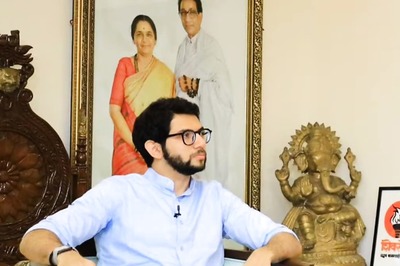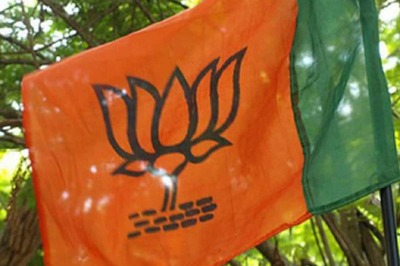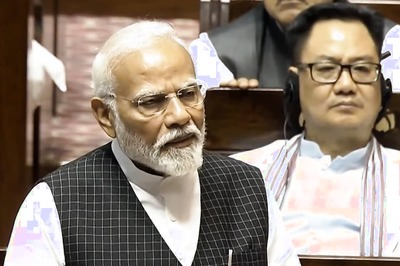
views
Call centre executives are taught to be persistent and intrusive. But in ‘call centres’ run by operators of predatory loan lending apps, these executives are trained in threats, harassment, extortion and even manipulating photos to blackmail those who file to repay the inflated loan on time.
The shady companies running these call centres disguise the operation as advertising agency, marketing firm or market research firm. Such call centres mushroomed in large numbers post-pandemic as the government eased the rules for ‘other service providers’. The Department of Telecom registers call centres as ‘Other Service Providers’ and all call centres require proper registration. But call centre run by these illegal loan apps exploit loopholes.
Unlike legitimate call centres that operate from business parks, these Chinese-run lending apps set up in areas that typically don’t house many offices. Staff working in these call centres are slotted into multiple levels and work as per their ‘bucket’.
A bucket means the level through which a customer is escalated when they refuse or fail to pay back the borrowed amount plus interest. A customer/debtor can be escalated to the top level within seven days, after which these call centre workers pull out all the stops to intimidate them. Tactics include threatening to send morphed photos and vulgar messages to their contacts.
In a special series recently, News18 had exposed how predatory loan lending apps masterminded by Chinese nationals were entrapping Indians, driving some to suicide, and posing security risks with access to data. The series had exposed how the people behind these apps threatened defaulters with social humiliation, intimidating them with drafts of vulgar photos and messages that they claimed would be sent to their contacts.
Arranging SIM Cards
Such a call centre, disguised as a market research firm, was raided by the Delhi Police in Dwarka Sector 3. Four people accused of running the operations were arrested and around 150 people working there were summoned for questioning. During investigation, it was found that the company purchased 300 SIM cards in its name to be given to the call centre staff.
News18 spoke to state police forces, including those in Delhi, Mumbai, Odisha and Telangana, to understand how these companies managed to get their hands on these many SIM cards without hassles. Turns out that once they floated the company, the operators contacted small-scale vendors for SIM cards. Acquiring such SIM cards needs company document and GST registration. These fake call centres call the SIM cards a “gift” for their employees. These cards are registered on the company address.
Along with the SIM cards, the company provided basic mobile phones – the kind that were in use in 2000, to the staff. The Delhi Police recovered 141 phones in one such case, of which 136 were basic feature phones. The call centre workers do use smartphones, but the access is limited.
WhatsApp Web in Incognito Mode
These call centre executives were found to be using WhatsApp calls and chats, even using the WhatsApp web version in the browser’s incognito mode. Officials in Telangana Police told News18 that in one such case, call centre staff used to log in from their ID, after which a ‘team leader’ used to log into WhatsApp web on multiple computers using one mobile phone.
“After logging into the systems with their login ID and password, all employees used to get phones which they used to call people. One team leader, meanwhile, would log into WhatsApp on different systems and the staff would use that account to threaten people,” a senior Telangana Police official told News18.
Separate Team to Morph Photos
The criminal enterprise run by these Chinese loan lenders and the call centres associated with them also include people and teams adept at morphing and editing photos. The companies gain access to customer photos in the tranche of permissions sought when a person downloads and starts using these lending apps. The same goes for access to contacts.
If a customer fails to pay the amount owed – principle plus heavy interest – these photos, edited to be obscene, are sent to them with the threat that these would also be forwarded to their contacts. In some cases, it was found that the call centre operators hired separate staff and set up separate teams to morph and edit photos. In some cases, the call centre staff followed through on the threat.
“In cases across India, it was found that contacts of victims received vulgar photos. These photos were first sent to another team, who within a few minutes, used to edit these with the face of the female victim,” a senior Delhi Police official, whose team arrested 150 call centre executives, told News18.
The Different ‘Buckets’
The call centre workers work as per the levels of escalation. The basic level is labelled A-1 or M-1, wherein call centre workers call up defaulting customers and threaten them for repayment. If customers refuse or are unable to repay immediately, the case is escalated to A-2 or M-2. At this stage, another executive uses WhatsApp to call and text the customers.
The next level means morphing photos and sending messages to the victim’s contacts. The levels escalate in this manner and reach the top most level within seven days, at which point all tactics used from the first onwards are thrown at the defaulting customer – threats, abusive messages, morphing images and sending humiliating messages and content to their contacts.
No Access to Server
No staff member is allowed blanket access to the servers that store details of debtors. They can access the data only after logging in using their login ID and password. Officials who busted call centres and are involved in the investigation say servers are located outside. The staff can access the data only after logging in. Once they log out, all the data is erased from their computers. There is no option to save the data either, and to ensure this special software programmed in China are used.
Read all the Latest News India and Breaking News here



















Comments
0 comment